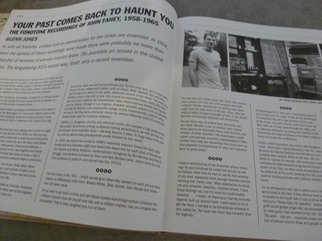
The other, the aforementioned book, is where the real difference between the digital download and the hard copy comes in, and it comes in big time. If you’ve had enough of those CD booklets with fonts that require the use of a magnifying glass, this one’s for you, folks.
Formatted to the same size as the good old fashioned 12-inch album, the core of the book is Malcolm Kirton's exhaustive 40-page analysis of every track on the six-hour set, bringing together Fahey's take on the material, along with his tunings and playing techniques. It’s a detailed portrait of a scrawny white kid from the outskirts of Washington, D.C. who has somehow become fascinated by obscure songs from obscure black bluesmen ignoring contemporary rock’n’roll and canvassing door to door in poor neighbourhoods looking for old records.
The recordings here were the other side to that coin, since Bussard was a noted collector and, in return for the playing while the tape rolled Fahey got booze and spare copies of folk, blues and bluegrass 78s from the twenties and thirties that were surplus to Bussard’s requirements.Kirton is also involved with The Fahey Files, an authoritative online archive of Fahey’s extensive discography maintained by the International Fahey Committee.
Apart from Kirton’s Notes on the Recordings the book,contains co-producer Glenn Jones’ Your Past Comes Back to Haunt You: The FonotoneRecordings of John Fahey, 1958-1965, which sets the scene for what follows, and his description of Nuts and Bolts of the Set. Italian researcher Claudio Guerrieri contributes The Transillumination of Blind Thomas, a guide to the hand-written labels Bussard attached to the individual hand-cut recordings, which leads into Kirton’s An Orchestra in Miniature: Fahey’s Guitars and His Emerging Techniques, Fahey’s childhood friend R. Anthony Lee’s “The Wolves are Gone Now”: The Early Musical Life of John Fahey, a Byron Coley poem, Douglas Blazek’s 1967 interview with Fahey, published here for the first time and Eddie Dean’s In Memory of Blind Thomas of Old Takoma - John Fahey, 1939-2001 add extra dimensions to what is already a wealth of detail.
Blind Thomas, for the uninitiated, was Fahey’s fictional ancient black bluesman alter ego on the sessions, the predecessor to Blind Joe Death who allegedly played a guitar made from a child's coffin and was struck blind and dumb for refusing to learn barre chords.